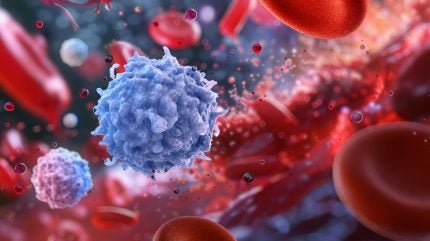

As it gradually makes its way into clinical stages, Pan Cancer T aims to increase the duration of response of T cells with its next generation TCR-T cell therapies, CEO Rachel Abbott told Pharmaceutical Technology.
The immunotherapy biotech, which is in the process of finalising the preclinical data package for its lead candidate, PCT1:COSTIM, is currently working towards completing the remaining chemistry, manufacturing, and controls (CMC) work for the candidate.

Discover B2B Marketing That Performs
Combine business intelligence and editorial excellence to reach engaged professionals across 36 leading media platforms.
As an autologous T cell product, PCT1 TCR-T involves T cells taken from the patient that are genetically engineered to express a specific receptor. This product candidate is designed to recognise the retinoblastoma tumor-suppressor gene (RB1) protein found in triple-negative breast cancer (TNBC) and melanoma, says Abbott. The next-generation PCT1:COSTIM takes the specificity of PCT1 TCR-T and integrates the biotech’s technology to modify the intracellular part of the T cell receptor, explains Abbott. The result is stronger durability of the T cells.
“Quite often with T cells, you will see that tumor regresses nicely, [but] then it will start to rebound. When we incorporate our costimulatory component into our T cell receptors, we see that the duration of response substantially significantly increases,” said Abbott.
The Rotterdam, Netherlands-based biotech has two proprietary technology platforms. The first is the T cell receptor discovery platform, which enables the company to identify optimal receptors for recognising cancer cells. The second is the next-generation COSTIM platform, designed to stimulate and enhance the T cell response in the inhibitory nature of the tumor microenvironment.
Pan Cancer T aims to take its lead candidate into Phase Ib/IIa clinical studies in H2 2026, says Abbott. The study, which would continue into 2027, will likely follow the precedent set by others developing TCR-based T cell therapies, says Abbott.

US Tariffs are shifting - will you react or anticipate?
Don’t let policy changes catch you off guard. Stay proactive with real-time data and expert analysis.
By GlobalDataThe initial portion of the study will test three different doses of T cells, which will be followed by the initiation of a 15-patient expansion cohort. This would essentially be the Phase IIa portion of the study evaluating patients at the optimal dose, Abbott explains.
With other candidates like the biotech’s PCT10 for ovarian cancer and the discovery-stage PCT6 in for the treatment of bladder, lung, colorectal, and esophageal cancers, Pan Cancer T is actively searching for partners or companies to license its technology platform, says Abbott.
Cell & Gene Therapy coverage on Pharmaceutical Technology is supported by Cytiva.
Editorial content is independently produced and follows the highest standards of journalistic integrity. Topic sponsors are not involved in the creation of editorial content.



